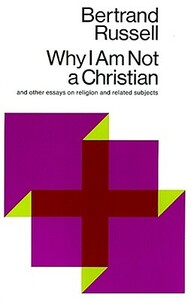You need to sign in or sign up before continuing.
Take a photo of a barcode or cover
117 reviews for:
Why I Am Not a Christian: And Other Essays on Religion and Related Subjects
Bertrand Russell
117 reviews for:
Why I Am Not a Christian: And Other Essays on Religion and Related Subjects
Bertrand Russell
A classic of atheist and rationalist thought. For all that the essays were written early last century, the arguments laid down easily stand the test of time, being familiar to anyone who's read modern works tackling the same issues.
I read this book as my philosophical and moral problems with christianity began to explode... and it helped me make the final break from believing in any sort of deity. It's like a breath of fresh air if all you've been raised with is religious morality.
funny
informative
reflective
medium-paced
http://edwardhenry.wordpress.com/2006/12/13/booklog-why-i-am-not-a-christian/
This is a collection of fifteen lectures and essays dating back to 1899, with the most recent essay written in 1952. Bertrand died in 1970. Overall, I really liked this collection, although each chapter / essay resonated at a different level with me.
Russell covers a gamut of subjects; notably: why he isn't a Christian (obviously), what he believes, do humans survive death?, life in the Middle Ages, the life of Thomas Paine, what constitutes a nice person, sexual ethics, freedom and colleges, and religion and morals. I highlighted much of some of the chapters and some I breezed through.
A number of the essays were written during the WWI and WWII eras so the events and players on the world stage of the times have much to do with Russell's context and chosen point of view. The "Nice People", "New Generation", and "Sexual Ethics" chapters come to mind. They apply less to the modern reader than when Russell wrote them in the 1930s.
The historical "Life in the Middle Ages" and "The Fate of Thomas Paine" were particularly interesting. I must read more about Thomas Paine. He had an interesting life.
Where the book shines, though, are the chapters challenging religion and promoting academic freedom. My highlighter got a workout in these chapters. Russell rose to prominence in a world even more backward than the one the religious right is currently driving us toward. He points out that, not long before he penned his religious criticism, that skepticism over believing the world was created before 4,004 BCE was thought to be an abominable crime. He relates the story of his great-great-grandfather who, after studying the depth of lava on Mount Etna, published an opinion that the world must be older than the orthodox supposed and for this offense was cut by the country and ostracized from society - the punishment would've been more severe if he had not been a humble man. Russell's conclusion in 1930 (!) was that "it is possible that mankind is on the threshold of a golden age; but, if so, it will be necessary first to slay the dragon that guards the door, and this dragon is religion".
There were parts in the 1940 "Freedom and the Colleges" which struck a cord with me as well. He recounts a humorous event in 1900 where the Flat Earth Society challenged all comers to debate in Durban and the only person to accept the challenge was a sea captain whose argument was that he saw this first hand. The flat earthers easily disposed of the captain and won the debate. 119 years later, this idea is still being brought to light by ignoramuses! A second anecdote which raised my blood pressure was taxpayers in 1940 believing that since they pay salaries of university teachers they have a right to decide what is taught. Citizens with no special competence demanding what is to be taught by those who are experts in their field! It reminds me of the push back my science teacher wife, Lisa, gets from parents on occasion when evolution is taught in science class. Some parents object and want a say in what is taught or isn't in science class. Spoiler alert: what they want taught in science class isn't science.
The book also contains a lengthy appendix and a helpful index. The appendix is the story of how Russell was prevented from teaching at the College of the City of New York. After his appointment to the position of Professor of Philosophy at the college was made public a number of religious and political zealots came out of the woodwork and raised their voices in opposition. This whole thing reads like one of these can't-make-it-up NetFlix true crime documentaries. It's quite a read in itself.
This is a very interesting look in to the mind of a great philosopher and writer, and winner of the Nobel Prize in Literature. Highly recommended.
Russell covers a gamut of subjects; notably: why he isn't a Christian (obviously), what he believes, do humans survive death?, life in the Middle Ages, the life of Thomas Paine, what constitutes a nice person, sexual ethics, freedom and colleges, and religion and morals. I highlighted much of some of the chapters and some I breezed through.
A number of the essays were written during the WWI and WWII eras so the events and players on the world stage of the times have much to do with Russell's context and chosen point of view. The "Nice People", "New Generation", and "Sexual Ethics" chapters come to mind. They apply less to the modern reader than when Russell wrote them in the 1930s.
The historical "Life in the Middle Ages" and "The Fate of Thomas Paine" were particularly interesting. I must read more about Thomas Paine. He had an interesting life.
Where the book shines, though, are the chapters challenging religion and promoting academic freedom. My highlighter got a workout in these chapters. Russell rose to prominence in a world even more backward than the one the religious right is currently driving us toward. He points out that, not long before he penned his religious criticism, that skepticism over believing the world was created before 4,004 BCE was thought to be an abominable crime. He relates the story of his great-great-grandfather who, after studying the depth of lava on Mount Etna, published an opinion that the world must be older than the orthodox supposed and for this offense was cut by the country and ostracized from society - the punishment would've been more severe if he had not been a humble man. Russell's conclusion in 1930 (!) was that "it is possible that mankind is on the threshold of a golden age; but, if so, it will be necessary first to slay the dragon that guards the door, and this dragon is religion".
There were parts in the 1940 "Freedom and the Colleges" which struck a cord with me as well. He recounts a humorous event in 1900 where the Flat Earth Society challenged all comers to debate in Durban and the only person to accept the challenge was a sea captain whose argument was that he saw this first hand. The flat earthers easily disposed of the captain and won the debate. 119 years later, this idea is still being brought to light by ignoramuses! A second anecdote which raised my blood pressure was taxpayers in 1940 believing that since they pay salaries of university teachers they have a right to decide what is taught. Citizens with no special competence demanding what is to be taught by those who are experts in their field! It reminds me of the push back my science teacher wife, Lisa, gets from parents on occasion when evolution is taught in science class. Some parents object and want a say in what is taught or isn't in science class. Spoiler alert: what they want taught in science class isn't science.
The book also contains a lengthy appendix and a helpful index. The appendix is the story of how Russell was prevented from teaching at the College of the City of New York. After his appointment to the position of Professor of Philosophy at the college was made public a number of religious and political zealots came out of the woodwork and raised their voices in opposition. This whole thing reads like one of these can't-make-it-up NetFlix true crime documentaries. It's quite a read in itself.
This is a very interesting look in to the mind of a great philosopher and writer, and winner of the Nobel Prize in Literature. Highly recommended.
informative
reflective
fast-paced
informative
reflective
slow-paced
"What is 'unrighteousness' in practice? It is in practice behavior of a kind disliked by the herd. By calling it unrighteousness, and by arranging an elaborate system of ethics around this conception, the herd justifies itself in wreaking punishment upon the objects of its own dislike, while at the same time, since the herd is righteous by definition, it enhances its own self-esteem at the very moment when it lets loose its impulse to cruelty. This is the psychology of lynching, and of the other ways in which criminals are punished. The essence of the conception of righteousness, therefore, is to afford an outlet for sadism by cloaking cruelty as justice."
"The good life is one inspired by love and guided by knowledge. Knowledge and love are both indefinitely extensible; Therefore, however good a life may be, a better life can be imagined."
"Love as an emotion-which is what I am speaking about, for love 'on principle' does not seem to me genuine-moves between two poles: on one side, pure delight in contemplation; on the other, pure benevolence. Where inanimate objects are concerned, delight alone enters in; we cannot feel benevolence toward a landscape or a sonata. This type of enjoyment is presumably the source of art. It is stronger, as a rule, in very young children than in adults, who are apt to view objects in a utilitarian spirit. It plays a large part in our feelings toward human beings, some of whom have charm and some the reverse, when considered simply as objects of aesthetic contemplation.
The opposite pole of love is pure benevolence...Parental affection, as a rule, is accompanied by pleasure in the child's appearance but remains strong when this element is wholly absent...it is difficult to find any other word to describe the desire for another person's welfare...
Love at its fullest is an indissoluble combination of the two elements, delight and well-wishing. The pleasure of a parent in a beautiful and successful child combines both elements; so does sex love at its best...Delight without well-wishing may be cruel; well-wishing without delight easily tends to become cold and a little superior."
"There is, so far as I know, no way of dealing with envy except to make the lives of the envious happier and fuller..."
"To be a nice person it is necessary to be protected from crude contact with reality, and those who do the protecting cannot be expected to share the niceness that they preserve."
"Children, like young trees, require soil and light and air and neighbors of their own kind. Children ought to be in the country, where they can have freedom without excitement."
"The good life is one inspired by love and guided by knowledge. Knowledge and love are both indefinitely extensible; Therefore, however good a life may be, a better life can be imagined."
"Love as an emotion-which is what I am speaking about, for love 'on principle' does not seem to me genuine-moves between two poles: on one side, pure delight in contemplation; on the other, pure benevolence. Where inanimate objects are concerned, delight alone enters in; we cannot feel benevolence toward a landscape or a sonata. This type of enjoyment is presumably the source of art. It is stronger, as a rule, in very young children than in adults, who are apt to view objects in a utilitarian spirit. It plays a large part in our feelings toward human beings, some of whom have charm and some the reverse, when considered simply as objects of aesthetic contemplation.
The opposite pole of love is pure benevolence...Parental affection, as a rule, is accompanied by pleasure in the child's appearance but remains strong when this element is wholly absent...it is difficult to find any other word to describe the desire for another person's welfare...
Love at its fullest is an indissoluble combination of the two elements, delight and well-wishing. The pleasure of a parent in a beautiful and successful child combines both elements; so does sex love at its best...Delight without well-wishing may be cruel; well-wishing without delight easily tends to become cold and a little superior."
"There is, so far as I know, no way of dealing with envy except to make the lives of the envious happier and fuller..."
"To be a nice person it is necessary to be protected from crude contact with reality, and those who do the protecting cannot be expected to share the niceness that they preserve."
"Children, like young trees, require soil and light and air and neighbors of their own kind. Children ought to be in the country, where they can have freedom without excitement."
Thought provoking but everuthing is about christianity so i was a bit disappointed by that
challenging
funny
informative
reflective
slow-paced


